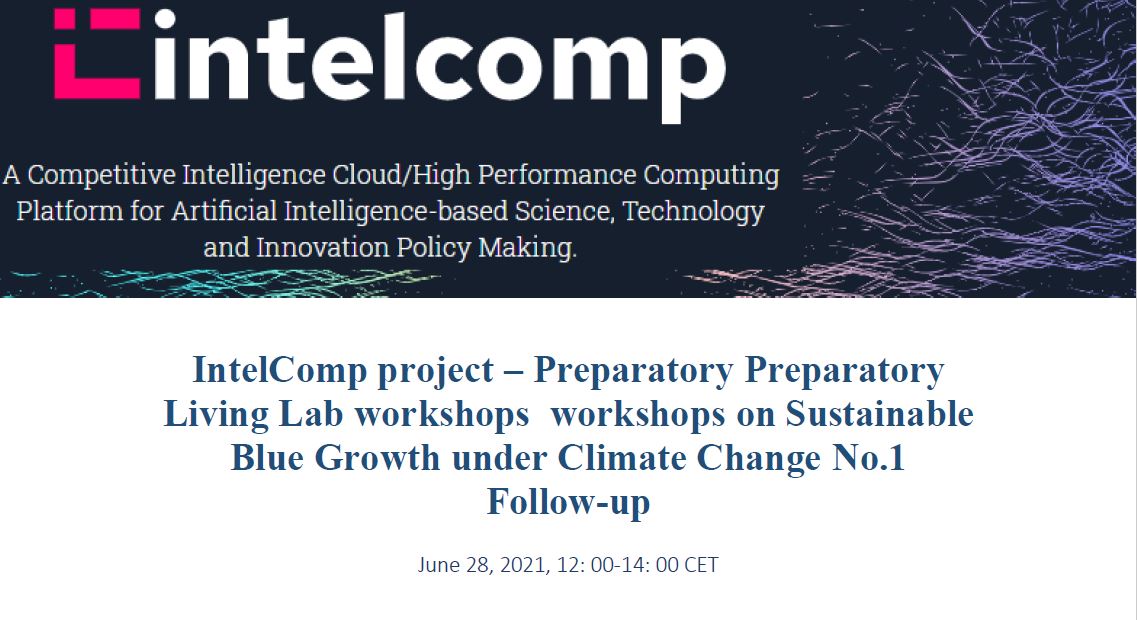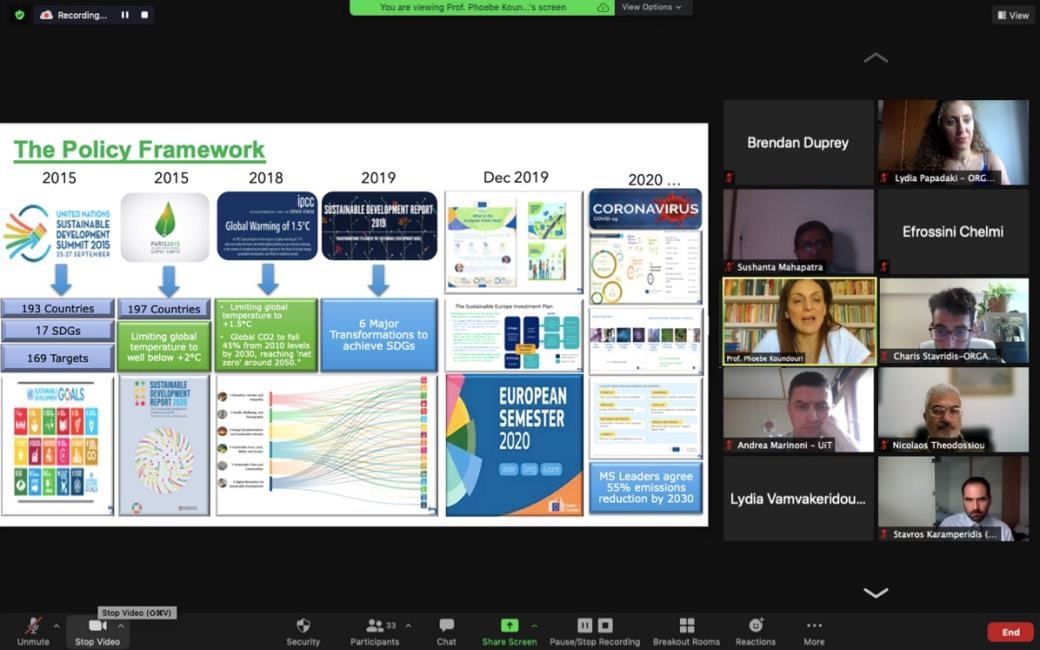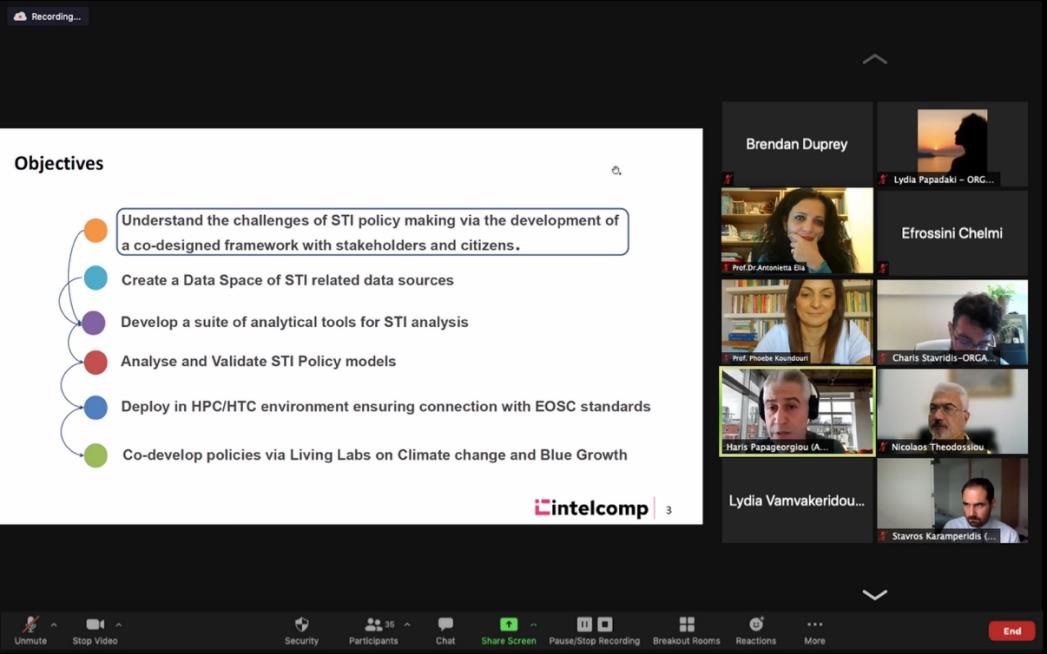
IntelComp project – Preparatory Living Lab workshops on Sustainable Blue Growth under Climate Change
It was great meeting you all at the kick-off meeting of the Preparatory Living Lab workshops on Sustainable Blue Growth under Climate Change as part of the IntelComp project funded by Horizon 2020 on Monday 28th April 2021. During this meeting, we got to know each other sharing the highlights of our work and we outset the initial goals and expectations of the upcoming preparatory Living Lab workshops. This series will explore the co-development and use of the IntelComp Platform for activities such as a holistic mapping and understanding of the laws, policies, and strategies at international, European and national level; and an analysis of innovations and new technologies to enhance mitigation and adaptation to climate change.
The Preparatory Living Lab workshops on Sustainable Blue Growth under Climate Change are
coordinated by
- Phoebe Koundouri, Professor and Director of ReSEES Research Laboratory, Athens University of Economics and Business; Director of Sustainable Development Unit and EIT Climate-KIC Hub Greece , Athena RC; Fellow World Academy of Art and Science; President-Elect of the European Association of Environmental and Resource Economists; Co-chair UN SDSN Europe and UN SDSN Greece
- Nicos Theodossiou, Professor at the Aristotle University of Thessaloniki, Chair UN SDSN Black Sea
Initially, Prof. Phoebe Koundouri introduced the climate change challenge and its impacts on the Seas as well as the preliminary goals and objectives of the project, while she presented the relevant projects and initiatives that will complement this process. She also stressed that through the cooperation of representatives of the state, civil society, scientists, researchers, and investors we will be able to jointly formulate action plans in line with European and national strategies that will facilitate the acceleration of science driven blue growth and the implementation of the United Nations Sustainable Development Goals (Agenda 2030) in the Euro-Asian Seas and beyond transition. In this context, Prof. Phoebe Koundouri briefly presented the political framework for the sustainable development, namely the UN Agenda 2030 and the 17 Sustainable Development Goals, the Paris Agreement, the European Green Deal and the Recovery Fund, which lay the foundations and the financing tools for the creation of synergies and for the acceleration of the sustainable development in these areas. Then, Prof. Nikos Theodossiou enriched the outline of these preparatory Living Lab workshops by highlighting the perspective of the involvement of a diverse composition of stakeholders, the importance of the Mediterranean Basin, Black Sea and Caspian Sea driving sustainability and finally the need for collaboration with everyone who is aligned with our goals and objectives.
Haris Papageorgiou, Research Director ATHENA RC, presented the IntelComp (Horizon 2020) Project, titled “A Competitive Intelligence Cloud/HPC Platform for AI-based STI Policy Making”, which will support the SDSN SEAs Initiative through a dedicated case study on Sustainable European and Asian Seas and Oceans. IntelComp sets out to build an innovative Cloud Platform that will offer Artificial Intelligence-based services to public administrators and policy makers across Europe for data- and evidence-driven policy design and implementation in the field of Science, Technology and Innovation (STI) policy. Large STI datasets are processed on High Performance Computing (HPC) environments that are part of the European Open Science Cloud (EOSC) initiative. Public administration at all geographical and organizational levels, STI stakeholders and civil society produce a great amount of dynamic, multilingual and heterogeneous data (e.g., national STI strategies, plans and work programmes, calls, projects, reports, scientific publications, patents, dissemination articles, etc.), so understanding and analyzing this data is crucial for evidence-based policy making.
The stakeholders who participated in the meeting came from the triangle of knowledge; namely, research, education and innovation as well as from the civil society, private sector and public and regulatory authorities. In particular, the following institutions followed the meeting:
- Institutes and Research Innovation Centres located in:
- Belgium: Centre for Social Innovation
- Cyprus: The Cyprus Institute
- Greece: ATHENA Research and Innovation Centre, Hellenic Centre for Marine Research (HCMR), Solmeyea, Machinor
- Italy: Eurac Research
- Kazakhstan: Ban Ki-moon institute for sustainable development at KazNU
- Netherlands: KWR Water Research
- Spain: Basque Centre for Climate Change
- Universities and Educational Institutions
- Greece: Athens University of Economics and Business (AUEB), Aristotle University of Thessaloniki (AUTh), National Technical University of Athens (NTUA)
- Kazakhstan: Nazarbayev University, Narxoz University
- India: ICFAI Business School (IBS)-Hyderabad
- Italy: University of Siena, Università degli Studi di Cagliari
- Moldova: Academy of Economic Studies of Moldova
- Norway: UiT the Arctic University of Norway
- Spain: Universidad Carlos III de Madrid, University of Santiago de Compostela
- Turkey: Yeditepe University
- U.K.: University of Plymouth
- Civil Society
- France: SDSN Europe
- Greece: SDSN Greece, SDSN Black Sea, ECOGENIA
- Italy: SDSN Mediterranean
- Kazakhstan: Solar Power Association of Qazaqstan (SPAQ)
- Public and Regulatory Authorities
- Greece: General Secretariat of Research and Innovation
- Belgium: European Commission, Conference of Peripheral Maritime Regions (CPMR)
- Kazakhstan: Project Office of the Prime-Minister of Kazakhstan
- Romania: General Secretariat of the Government - Department of Sustainable Development
Then several the participants took the floor and introduced themselves:
RESEARCH & INNOVATION
Dr Giannoudi Louisa, Research Fellow, Hellenic Centre for Marine Research, Greece. She started almost a year to work on the subject of climate change focusing on detecting carbon dioxide in the water. She is really interested to see the anthropogenic pressure we have in the atmosphere directly in the marine waters and she believes it’s an opportunity to discuss with people from the same subject.
Dr Giannoudi Louisa, Research Fellow, Hellenic Centre for Marine Research, Greece. She started almost a year to work on the subject of climate change focusing on detecting carbon dioxide in the water. She is really interested to see the anthropogenic pressure we have in the atmosphere directly in the marine waters and she believes it’s an opportunity to discuss with people from the same subject.
Mr Stenos Vasilis, Founder, Solmeyea, Greece. Solmeyea (solmeyea.com) is a start-up focusing on vertical microalgae farming by utilizing certain volumes of C02 emissions trying to valorize the marine sector and he is looking forward to work with the others.
Dr. Marta Pascual, Researcher at the Basque Centre for Climate Change (BC3), Spanish Hub/Focal Point for the European WestMed Initiative and the European Atlantic Action Plan, Member of expert groups of the MSD platform. Hearing about the IntelComp project, sheoffered the collaboration of her team, because in BC3, they have developed their own AI platform (ARIES) that works with its own semantics, and they believe that in order to get a real AI interoperability it all comes in the end to the semantics. The developed semantics are able to link the different models, data, policy, languages that they use, to be able to provide a decision support system. So far ARIES has already been used for ecosystem services modelling, semantic metamodelling and more recently in natural capital accounting. More information can be found at: WestMED Initiative, ARIES and integrated modelling.
UNIVERSITIES AND ACADEMIA
Dr Karamperidis Stavros, Senior Lecturer, Head of Maritime Transport Research Group, Univeristy of Plymouth, United Kingdom. His research interests are shipping, decarbonization of the maritime transport sector, maritime logistics, maritime security (physical or cyber), port management, models application on the maritime sector. He is looking forward to collaborating with the team.
Mrs Tsaimou Christina, PhD Candidate, National Technical University of Athens, Greece. She focuses on monitoring seaport infrastructure and climate change effects, and she mentioned that is very excited to be part of this group.
Dr Eugenia Busmachiu, Associate Professor, Academy of Economic Science of Moldova, Republic of Moldova. Her area of expertise is the water sector, and she is glad to be part of this series and share her experience and insights from her country.
Mr Ranalli Matteo, Sustainable blue economy expert, Università di Cagliari, Italy. His research interests are the Maritime sector from the shipping industry (environmental protection, waste and water management, atmospheric emissions, wastewater management in the port areas). He is currently participating as an expert to “GRRinPORT”, an Interreg project about sustainable management of waste and wastewater in Italian and French port areas (University of Cagliari, Italy). He believes that IntelComp can play a role in science diplomacy, and he is looking forward to work closely with the rest of the participants.
Dr Dube Manu, Assistant Professor, Yeditepe University, Turkey. His background is mechanical engineering, but his current interests are in the manufacturing business and economic opportunities of green practices and how can we adopt policy that help SMEs adopt green pratices.
Dr Sushanta Kumar Mahapatra, Post-Doctoral Fellow, Department of Science Economics (DSE), University of Bologna, (Italy) (European Commission Erasmus Mundus fellowship) & Assoc. Professor at the Department of Economics, IBS Hyberabad (India). He is specialized on environmental development economics from the perspective of Climate Change working on Asia and India case studies.
Ms Suyunchaliyeva Maiya, PhD student, Coordinator of volunteers, Ban Ki-moon institute for Sustainable development at Al-Farabi Kazakh National University (KazNU), Kazakhstan. She focused on three topics: International Cooperation, Research and Model United Nations for younger generations. They aid young researchers take their projects globally. They invite international professors who share their experience, leadership skills and soft skills to help youth develop these skills. She personally works on SDG4, by the realization of a social education project oriented to young people who wish to grow and work on their professional skills, SDG9 and SDG11, mainly on the improvement of tourism. Finally, she highlighted her excitement of being part of this group.
Dr Xenarios Stefanos, Associate Professor, Nazarbayev University, Kazakhstan. His background is on environmental economics and interested in mitigating measures for Kazakhstan and Central Asia as well. Ms Ismailova Aizada, Project Manager, Nazarbayev University, Kazakhstan. Her background is in engineering, and she has experience on management consulting, solid waste management. Her centre is interested in the blue growth and that’s how she is interested to learn more about this initiative.
Dr Duprey Brendan, Director, Associate Professor, Sustainable Kazakhstan Research Institute, Narxoz University, Kazakhstan. He is interested in bridging the gap between traditional academic research and practice using a system thinking approach. In relation to climate change, he is happy to support the Government’s priority to transit to renewable energy resources. Policy development is one of his interests and he is looking forward to learn more about the work done in the Mediterranean as well as for other research projects and activities.
Ms Kazbek Madina, Project Manager, Nazarbayev University, Kazakhstan. She is working on different thematic priorities, food systems, conservations and she interested in this initiative and the sustainability aspects of this area.
Prof Dr Elia Antonietta, Associate Prof of Law, University of Santiago de Compostela, Spain. She has an interdisciplinary background combining the law and the political sciences. She is specialized on EU and International Law. Her research interest is on human rights and the effective implementation of policies. Her experience on human rights and the climate change comes from her involvement in the network of Mediterranean Experts on Climate and Environmental Change (MedECC). She is also interested in the energy transition in the Mediterranean working on a relevant project.
Dr Moustakis Fotios Associate Professor and Director, University of Plymouth, United Kingdom. As a University, they are trying to raise awareness about the effect that climate change will have to territories and borders, resources, economic prospects, infrastructure and migration between countries.
Mrs Chalastani Vassiliki, PhD Candidate, National Technical University of Athens, Greece. Her research interests are marine spatial planning, climate change adaptation and vulnerability assessment for coastal areas and she is looking forward to the next steps of the preparatory Living Lab workshops.
Dr Marinoni Andrea, Associate Professor, UiT the Arctic University of Norway. His research focuses on the development of multi model artificial intelligent methods, which means that he tries to extract information from landscape and heterogenous datasets from different scenarios from sea level rise to sea rise characterization. He is part of the new Green Deal project entitled dynamic information management approach for the implementation of climate resilient adaptation packages in european regions (IMPETUS Horizon 2020).
CIVIL SOCIETY
Mr Erac Andrija, Manager, SDSN Europe. He works to align the EU recovery with the SDGs and the Paris Climate Agreement. He is looking forward to the preparatory Living Lab workshops and to promote the outcomes of these discussions via SDSN Europe.
Mr Papadosifos Stefanos, Program Development Manager, Ecogenia, Greece. Mr. Papadosifos referred to ECOGENIA, a new NGO dedicated to promoting sustainability through civic engagement, training and employment opportunities for young people in Greece. One of their target sectors is to make the shipping sector in Greece sustainable.
PUBLIC AND REGULATORY AUTHORITIES
Vasileios Liogkas, Policy Officer, European Commission. Mr Liogkas declared that he is honored to be part of this project on Sustainable Development and Climate Change. His background is on mechanical engineering specified in environmental policies and in circular economy, while his work in the European Commission in DG Environment, dealing with Environmental Policies implementation would enhance the goals of this project. He has also served as an advisor to the Greek Ministers of Environment and Energy.
Mrs Chelmi Efrossini, Project Manager, General Secretariat of Research and Innovation, Greece. She is a mechanical engineer and she is doing her PhD on sustainable shipping and aviation.
Mr Zharmukhambetov Adil, Lead of "Water Resources" Team under the Project Office of the Prime-Minister of Kazakhstan, Project Office of the Prime-Minister of Kazakhstan, Kazakhstan. Mr Zharmukhambetov Adil is lead the "Water Resources" team, which is an initiative of the Prime-Minister of Kazakhstan, and they are working on the legal documents, automatization and digitalization of the water accounting in Kazakhstan using international experience.
The meeting was supported by Lydia Papadaki, Manager UN SDSN Greece and Charis Stavridis, Manager UN SDSN Black Sea and joined by several experts and scientists from all around the world, as follows:
- Mr Kalognomos Stavros, Executive Secretary of the Balkan and Black Sea Commission (BBSC) Conference of Peripheral Maritime Regions (CPMR)
- Mr Liogkas Vasileios, Policy officer, European Commission
- Prof. Dr. Lange Manfred, Director, Future Earth MENA Regional Center, The Cyprus Institute
- Mr Erac Andrija, Manager, SDSN Europe
- Dr Papageorgiou Haris, Research Director, ATHENA RC
- Mr Papadosifos Stefanos, Program Development Manager, Ecogenia
- Mrs Chelmi Efrossini, Project Manager, General Secretariat of Research and Innovation
- Dr Simone Cresti, Manager of SDSN Mediterranean
- Dr Giannoudi Louisa, Research Fellow, Hellenic Centre for Marine Research
- Dr Kapetanaki Natalia, Chemical Engineer, Machinor
- Mrs Tsaimou Christina, PhD Candidate, National Technical University of Athens
- Mrs Chalastani Vasiliki, PhD Candidate, National Technical University of Athens
- Mr Stenos Vasilis, Founder, Solmeyea
- Dr Mahapatra Sushanta Kumar, Associate Professor, Department of Economics, IBS Hyderabad, The ICFAI Foundation for Higher Education (IFHE) Deemed University
- Dr Gantioler Sonja, Senior Researcher, Eurac Research
- Mr Ranalli Matteo, Sustainable blue economy expert, Università di Cagliari
- Dr Duprey Brendan, Director (Associate Professor) Sustainable Kazakhstan Research Institute, Narxoz University
- Dr Xenarios Stefanos, Assoc. Professor, Nazarbayev University
- Mrs Ismailova Aizada, Project Manager, Nazarbayev University
- Mrs Assubayeva Aliya, PhD Candidate, Nazarbayev University
- Ms Kazbek Madina, Project Manager,Nazarbayev University
- Ms Sospanova Ainur, Chairman of the Board Solar Power Association of Qazaqstan
- Ms Suyunchaliyeva Maiya, Coordinator of volunteers, Ban Ki-moon institute for sustainable development at KazNU
- Dr Vamvakeridou-Lyroudia Lydia, Director, WATERSHARE KWR Water Research
- Professor Nyseth Torill, Professor, Uit The Arctic University of Norway
- Dr Eugenia Busmachiu, Associate Professor Academy of Economic Science of Moldova
- Mrs Achimescu Diana, senior adviser General Secretariat of the Government - Department of Sustainable Development
- Dr Pascual Marta, Associated Researcher, Basque Centre for Climate Change (BC3)
- Dr Arenas-García Jerónimo, Associate Professor, Universidad Carlos III de Madrid
- Dr Dube Manu, Assistant Professor, Yeditepe University
- Dr Karamperidis Stavros, Head of Maritime Transport Research Group, Univeristy of Plymouth
- Dr Moustakis Fotios, Associate Professor and Director, University of Plymouth
- Mr Zharmukhambetov Adil, Lead of "Water Resources" Team under the Project Office of the Prime-Minister of Kazakhstan Project Office of the Prime-Minister of Kazakhstan
- Professor Antonietta Elia, University of Santiago de Compostela
- Dr Dall Elke, Representative in Brussels, senior expert, Centre for Social Innovation
- Dr Marinoni Andrea, Associate Professor, UiT the Arctic University of Norway
This project is part of the UN SDSN SEAs Initiative, which aims to accelerate science driven blue growth and the implementation of the United Nations Sustainable Development Goals (Agenda 2030) in the Euro-Asian Seas and beyond. The initiative aims to bring together in an interdisciplinary framework the work of SDSN National and Regional Networks that is related to Blue Growth. It will introduce a regular annual report on Technological, Economic and Social Transition Pathways of accelerating the systemic transformation required for the implementation of Agenda 2030 in our Seas and Oceans, including Science-Technology and Innovation-Policy interface agenda setting, model design, implementation, monitoring and evaluation. This initiative builds on SDSN Greece, SDSN Black Sea and SDSN Mediterranean, which brought together the 4-Seas Initiative, the Global Roundtable for Sustainable Shipping and Ports, the Plastic Busters Initiative, the newly formed Global Maritime Accelerator, and several Blue Growth research projects.
The Initiative is coordinated by
- Phoebe Koundouri, Professor and Director of ReSEES Research Laboratory, Athens University of Economics and Business; Director of Sustainable Development Unit and EIT Climate-KIC Hub Greece , Athena RC; Fellow World Academy of Art and Science; President-Elect of the European Association of Environmental and Resource Economists; Co-chair UN SDSN Europe and UN SDSN Greece
- Nicos Theodossiou, Professor at the Aristotle University of Thessaloniki, Chair UN SDSN Black Sea
- Yannis Ioannidis, Professor at the National and Kapodistrian University of Athens, Former President ATHENA Research and Innovation Centre, UN SDSN Greece Strategic Advisory Board
- Andreas Papandreou, Professor National and Kapodistrian University of Athens, co-chair UN SDSN Greece

Figure 1 - Prof Koundouri presenting the goals of these Preparatory Living Lab workshops

Figure 2 – Dr Papageorgiou presenting the IntelComp (H2020) project.